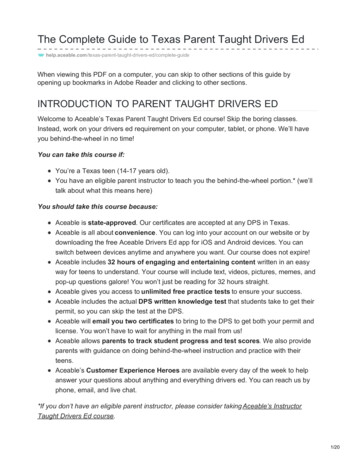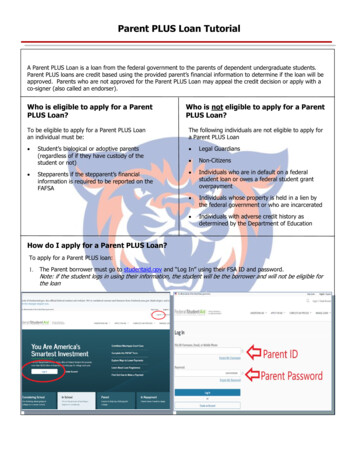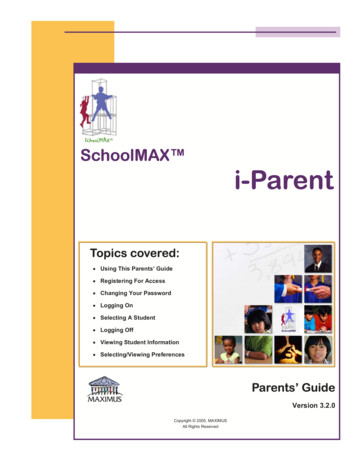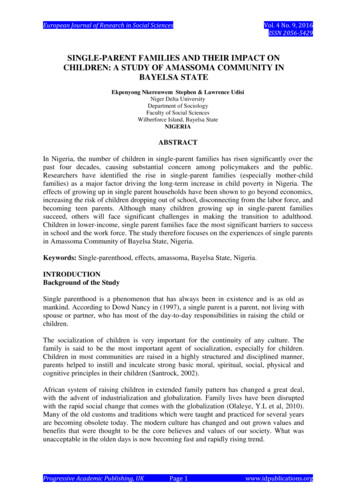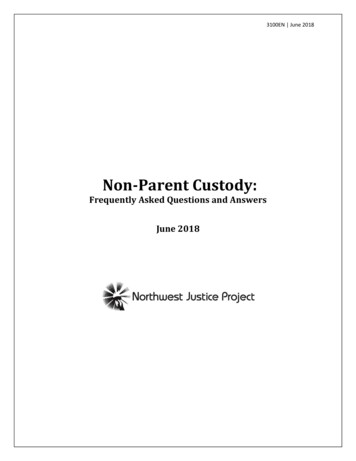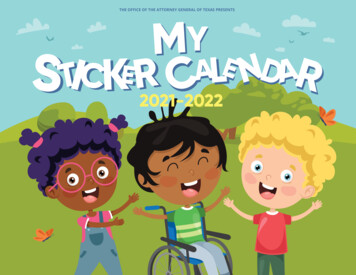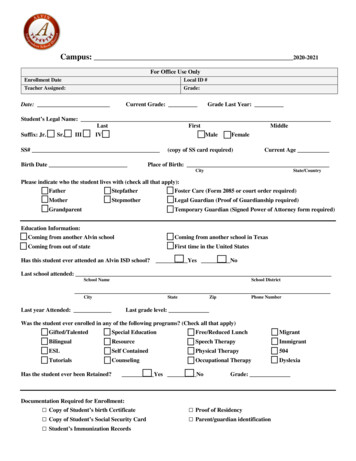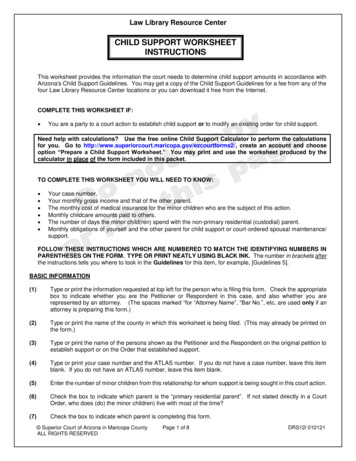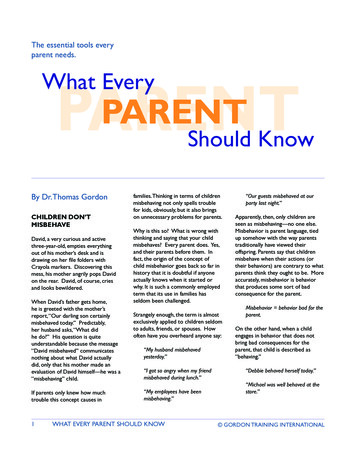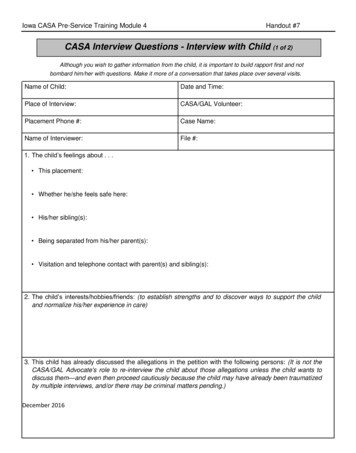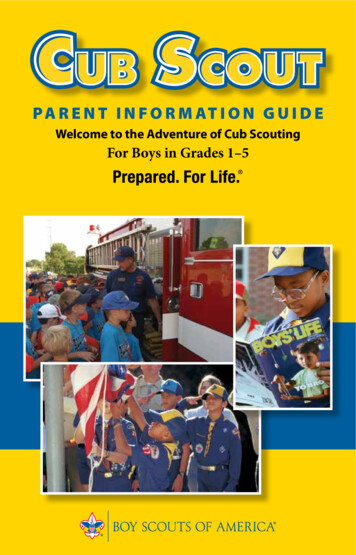
Transcription
P a r e n t I n f o r m at i o n G u i d eWelcome to the Adventure of Cub ScoutingFor Boys in Grades 1–5
Why Join Cub Scouting? Your time is valuable. More than ever, today’s families struggle to find timeto spend together. Cub Scouting helps to support your family by providingready-made opportunities for you and your son to do things together. Your son needs to belong to a group of boys his own age. Through this senseof belonging, he builds his self-esteem and learns to get along with others. Asa parent, you want to be assured that the groups that your boy joins will teachvalues consistent with good citizenship, character development, and physicalfitness. The Boy Scouts of America has been weaving these lifetime values intofun and educational activities since 1910. In a society where your son is taught that winning is everything, Cub Scoutingteaches him to “do his best” and to be helpful to others. Scouting teaches family values and works to strengthen your relationship withyour son. Scouting activities can bring added value to the time you alreadyhave with your son. He will learn to live by the code of “On my honor.”But we know that boys do not join Cub Scouting just to get their character built.Boys join because it is fun.2
How Does Cub Scouting Work?One unique thing about Cub Scouting is that you, as his family, join in on theprogram with your son, and you will help him along the way. The family is thebasis of Cub Scouting. It exists to support your family and help enrich yourfamily time together. Boys have a different handbook at each grade level, withsuggested activities that are age-appropriate for their developmental level. As yourboy advances through these books by working on activities with you, he will earnbadges and other recognition that he can wear on his uniform. Your son’s successin Cub Scouting depends on you!The Cub Scouting program takes place at two levels. Your son will be a part of a den,a small group of boys in the same grade level who usually meet weekly. All dens, fromgrades 1 through 5, make up a pack. Once a month, the dens, withtheir families, are together at the pack meeting, where boys show offthe new skills they have learned during the month and are recognizedfor the badges they have earned. All boys, when they join, earn theBobcat badge first. Your den leader will show you how.DensThe Tiger Cub Den (Grade 1)Parents are most involved at the Tiger Cub level. The boy and hisparent or guardian join the den together and attend all meetingsand activities together.The den is made up of three to eight of these parent-son teams. Each denalso has a Tiger Cub den leader (usually one of the parents) who helps coordinatethe meetings. The parent-son teams take turns running the activities and planningmeetings with the Tiger Cub den leader. The den usually meets weekly either at thehomes of host parent-son teams or at a designated facility; participates in Go SeeIts (with the den, as a group, visiting a community place of interest); and attendsthe monthly pack meeting.3
The Wolf Cub Scout (Grade 2) and Bear Cub Scout(Grade 3) DensParents are vital to the Cub Scout dens, both in the role of homesupport and to help the den leader, but their sons are beginning to bemore independent, and not every boy needs a parent at every meeting.The den consists of four to eight boys, a den leader and assistant denleader (usually parents of some of the boys), and often a den chief(an older Boy Scout or Venturer who helps the den leader).They usually meet once a week at a regularly scheduled time andplace, and they also attend the pack meeting with their families.The Webelos Scout Den (Grades 4 and 5)The Webelos den is much like the Cub Scout dens, but there ismore emphasis on the boys learning to take leadership roles andpreparing to become Boy Scouts.Pack MeetingsThe Cub Scout pack is made up of all the dens, which meet monthly at the packmeeting, led by the Cubmaster. This is the climax of the weekly den meetings andactivities. There are games, skits, songs, ceremonies, and presentations of badgesthat boys earned during that month. This is where families—not just parents, butsiblings, too—can see the achievements of their Cub Scout.The pack, including families, also participates in other special events throughoutthe year, including:Pinewood derby —You can build and race a model car with your son.Blue and gold banquet—Cub Scouting’s birthday party—for all pack membersand their families—in February.Camping—Overnight and day camp opportunities introduce your family to thecamping experience.4
Service projects—Packs may participate in food drives, conservation projects, orother community activities.Field trips and special outings—Great ways to learn more about the people andplaces in your community.Make memories with your son that will last a lifetime!How Can You Help?The most important help that you, as a parent, can give your boy is to workwith him on his Cub Scouting activities. His handbook is full of age-appropriateactivities that you will enjoy doing together at home. When he completes anactivity or project, it is your responsibility to sign his book to verify that he hasdone his best. And then it is all-important for you to attend the monthly packmeeting with him, so that you can celebrate his achievement. Your role as a parentis the secret to a successful Cub Scouting program!The den and the pack also rely on parent participation to run a successful program.Cub Scouting operates through volunteer leadership. Consider volunteeringas a member of the pack leadership team. Volunteer leaders are an example ofScouting’s principle of service to others. By volunteering in Scouting, you are alsogiving your son the gift of your time. What could be more valuable? You will havean opportunity to be a positive influence in the lives of him and his friends. Hereare some of the ways you could volunteer:Den leader. Leads the den at weekly den and monthly pack meetings. Attends themonthly pack committee meeting.Cubmaster. Helps plan and carry out the pack program with the help of the packcommittee. Emcees the monthly pack meeting and attends the pack committee meeting.5
The Pack CommitteePack committee members (positions listed below) perform administrative functions of thepack. The committee meets monthly.Committee chairman. Presides at all pack committee meetings. Helps recruit adult leadersand attends the monthly pack meeting and pack committee meeting.Advancement chairman. Maintains advancement records for the pack. Orders and obtainsall badges and insignia. Attends the monthly pack meeting and pack committee meeting.Membership chairman. Manages the transition of new Scouts into the pack andcoordinates orientation for new Scouting families. Responsible for the marketing andrecruiting initiatives of the pack, as well as the growth and retention of the unit.Secretary/treasurer. Keeps all records for the pack, including pack bank account, financialrecords, etc. Attends the monthly pack meeting and pack committee meeting.Pack trainer. Coordinates Fast Start training for adults. Promotes leader training androundtable meeting attendance. Attends the monthly pack meeting and packcommittee meeting.TrainingThe Boy Scouts of America offers convenient training for everyone—parents, leaders, andyouth members. As a new parent, you can learn all about Cub Scouting and the wonderfulyear-round adventure your Cub Scout is about to experience. Log on to www.scouting.org,click the “Parent” tab, and then “Training,” and you will discover all of the courses available.Create a MyScouting account and get started.We encourage all parents to take the BSA’s Youth Protection training.To find out more about the Youth Protection policies of the Boy Scouts of Americaand how to help Scouting keep your family safe, see the Parent’s Guide in any of theCub Scouting or Boy Scouting handbooks, or go to th ProtectionChild abuse is a serious problem in our society, and unfortunately, it can occur anywhere,even in Scouting. Youth safety is of paramount importance to Scouting. For that reason, theBSA continues to create barriers to abuse beyond what have previously existed in Scouting.The Boy Scouts of America places the greatest importance on providing the most secureenvironment possible for its youth members. To maintain such an environment, theBSA has developed numerous procedural and leadership selection policies, and providesparents and leaders with numerous online and print resources for the Cub Scout,Boy Scout, and Venturing programs.Youth Protection training is required for all BSA registered volunteers.New leaders are required to complete Youth Protection training within 30 days of6
registering. To take the training online, go to www.MyScouting.org and establish anaccount using the member number you receive when you register for BSA membership.If you take the training online before you obtain a member number, be sure to returnto MyScouting and enter your number for training record credit. Your BSA localcouncil also provides training on a regular basis if you cannot take it online. For moreinformation, refer to the back of the BSA adult membership application, No. 524-501.Youth Protection training must be taken every two years. If a volunteer’s Youth Protectiontraining record is not current at the time of recharter, the volunteer will not be registered.How Much Does Scouting Cost?Registration fee—annual fee for youth and leaders(The leader’s fee includes a subscription to Scouting magazine.): . 24Boys’ Life magazine—optional, but strongly recommended: . 12Books—Youth handbooks are the Tiger Handbook, Wolf Handbook, BearHandbook, and Webelos Handbook. Adult leaders use one or more of the followingresources: the Cub Scout Leader Book, Cub Scout Academic and Sports ProgramGuide, Cub Scout Den & Pack Meeting Resource Guide, and Webelos Leader Guide.See your local Scout shop or www.scoutstuff.org for prices and a wealth of otherreasonably priced resources.Pack dues—The amount varies by pack, depending on money-earning projectsconducted by the pack to decrease the amount needed to run the pack program.Uniform—The uniform and its cost vary by program for both youth and adult.Uniforms may also be purchased at your local Scout shop. See www.scoutstuff.orgfor details and current prices.Spending Time With Your Child: The Secret of Success!Come join the fun of Cub Scouting as a family it’s fun! You’ll make newfriends, too, as you work with the parents of your son’s new friends. No taskis too difficult when you’re having fun as part of a team of Cub Scout parents,reinforcing each other’s efforts to help your boys grow up to be good citizens.7
You Are Not Alone!Your den is in a pack that belongs to an organization chartered by the Boy Scoutsof America (BSA) to operate a Scouting unit (a chartered organization). Thechartered organization approves leadership, helps secure a meeting place, and makessure that the pack works within the guidelines and policies of their organization aswell as those of the BSA.Your pack is a member of a district, a geographic area of the BSA local councilthat helps support the pack in providing a successful and high-quality program.An employee of the local council, a unit-serving executive (district executive), isassigned to assist the packs in your district.Your district also has a volunteer team called the commissioner staff. They are a“service team” that checks on the program “health” of your pack, and they are acommunication link between your pack and the local council. A commissioner isassigned specifically to assist your unit.All leaders need training to be effective. Your district provides online or instructor-ledtraining for adult volunteers in how to be a successful leader.Your district is one of several in the BSA local council. The professional staff atyour council service center can help or will get you in touch with someone who can.1855Our Mother of ConsolationMy son is in Pack ,which meets at(location)7:00PMthe third Wednesday of the month (day and week of month).at (time) onHe is in Den , which meets at (location)at (time) on (day of week).Our Mother of Consolation Catholic ChurchOur pack’s chartered organization is .Northern DistrictOur pack is in district .Cradle of Liberty CouncilOur local council name is .Phone No. WebsiteOur LeadersNameDen leaderPeter AmusoCubmasterJoe LeissUnit-serving executiveBolgerUnit commissioner ChuckDistrict training chairmanPack trainerGloria Di LulloPack membership chairPhone No.(215) c.comtsbyglo@gmail.comSKU 619701Boy Scouts of America1325 West Walnut Hill LaneP.O. Box 152079Irving, Texas 75015-2079www.scouting.org307012014 Printing
The Wolf Cub Scout (Grade 2) and Bear Cub Scout (Grade 3) Dens Parents are vital to the Cub Scout dens, both in the role of home support and to help the den leader, but their sons are beginning to be more independent, and not every boy needs a parent at every meeting. The den consists of four to eight boys, a den leader and assistant den
